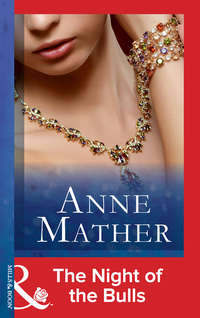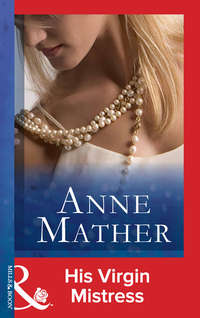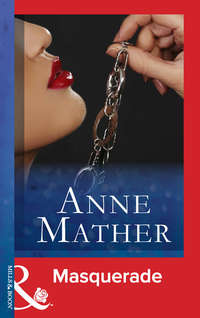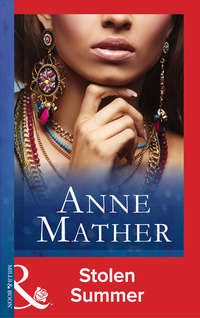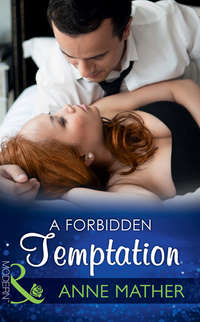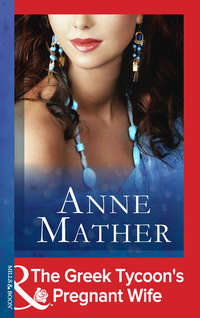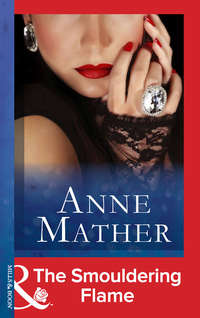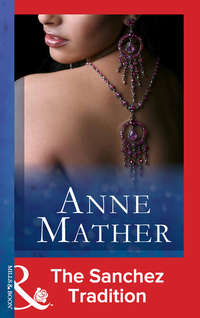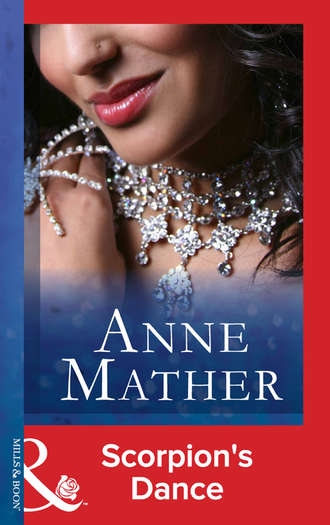
Полная версия
Scorpion's Dance

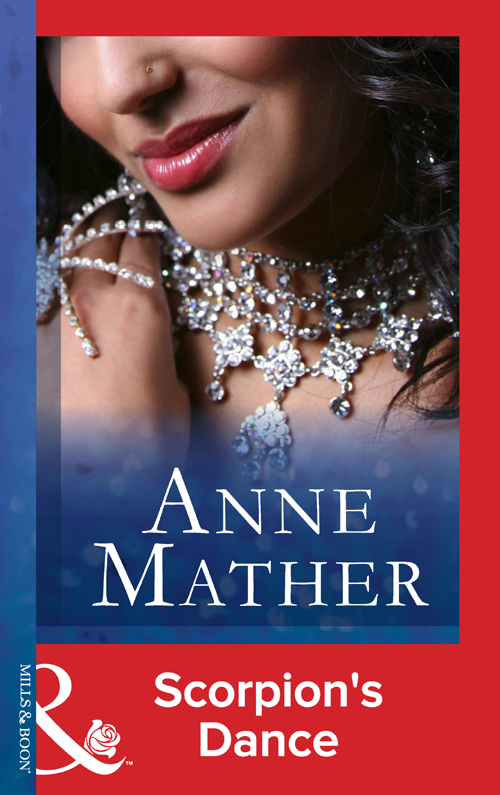
Mills & Boon is proud to present a fabulous collection of fantastic novels by bestselling, much loved author
ANNE MATHER
Anne has a stellar record of achievement within the
publishing industry, having written over one hundred
and sixty books, with worldwide sales of more than
forty-eight MILLION copies in multiple languages.
This amazing collection of classic stories offers a chance
for readers to recapture the pleasure Anne’s powerful,
passionate writing has given.
We are sure you will love them all!
I’ve always wanted to write—which is not to say I’ve always wanted to be a professional writer. On the contrary, for years I only wrote for my own pleasure and it wasn’t until my husband suggested sending one of my stories to a publisher that we put several publishers’ names into a hat and pulled one out. The rest, as they say, is history. And now, one hundred and sixty-two books later, I’m literally—excuse the pun—staggered by what’s happened.
I had written all through my infant and junior years and on into my teens, the stories changing from children’s adventures to torrid gypsy passions. My mother used to gather these manuscripts up from time to time, when my bedroom became too untidy, and dispose of them! In those days, I used not to finish any of the stories and Caroline, my first published novel, was the first I’d ever completed. I was newly married then and my daughter was just a baby, and it was quite a job juggling my household chores and scribbling away in exercise books every chance I got. Not very professional, as you can imagine, but that’s the way it was.
These days, I have a bit more time to devote to my work, but that first love of writing has never changed. I can’t imagine not having a current book on the typewriter—yes, it’s my husband who transcribes everything on to the computer. He’s my partner in both life and work and I depend on his good sense more than I care to admit.
We have two grown-up children, a son and a daughter, and two almost grown-up grandchildren, Abi and Ben. My e-mail address is mystic-am@msn.com and I’d be happy to hear from any of my wonderful readers.
Scorpion’s Dance
Anne Mather

Table of Contents
Cover
About the Author
Title Page
CHAPTER ONE
CHAPTER TWO
CHAPTER THREE
CHAPTER FOUR
CHAPTER FIVE
CHAPTER SIX
CHAPTER SEVEN
CHAPTER EIGHT
CHAPTER NINE
CHAPTER TEN
CHAPTER ELEVEN
CHAPTER TWELVE
CHAPTER THIRTEEN
Copyright
CHAPTER ONE
MIRANDA COULD remember clearly the first time she saw Jaime Knevett.
It was on the occasion of her tenth birthday, and as a special treat, Lady Sanders had agreed to a birthday party on the lawn, out of sight of the house, of course. Miranda could recall the excitement with which she had anticipated her birthday. Until that time, birthdays had been very little different from any other day, with perhaps a trip to the pictures in the evening, after her mother had finished the preparations for dinner.
But that was hardly unusual in the circumstances. After all, housekeepers’ children should be seen and not heard, or so she had always been led to believe, and no one could deny that Lady Sanders had been kind to her mother when her father died so suddenly, leaving his wife with a three-year-old daughter, and no visible means of support.
Her father had been a farm worker and their cottage was tied to his job. Naturally, when he died the cottage was required for his replacement, and Miranda’s mother had been desperate when Lady Sanders, who incidentally owned the estate on which their cottage stood, had suggested she should come and live at the Hall. Her housekeeper was getting near retirement age, Lady Sanders explained, and reliable help was so hard to find these days.
By taking in Lucy Gresham and her fatherless little daughter, Lady Sanders assured herself of ‘reliable help’ for numerous years to come, but it was only as she got older that Miranda got more cynical. At ten, she was still young enough to take kindness at its face value, and at three she had no opinion at all.
Lady Sanders was a widow. Her husband had been killed in a road accident a year after Miranda was born, and the less charitable people in the village had been heard to express the opinion that it was fortunate he had only wrapped his own car round the tree and not someone else’s. It seemed the late Lord Sanders had imbibed rather freely, and it was chance rather than good fortune which had kept him alive as long as it did.
After his death, Lady Sanders assumed the running of the estate with an assurance that revealed she had been doing so surreptitiously for years. She had one son, the new Lord Sanders, and she was determined that his inheritance should in no way suffer through the death of his father.
Miranda saw Mark Sanders rarely during her formative years. The local prep school, followed by succeeding boarding schools, took care of his education, and in the holidays his mother took care never to let him out of her sight. Mrs Gresham explained that Lady Sanders worshipped the boy, and now that her husband was dead, she had no one else. It seemed a lonely existence to Miranda who, in spite of the strictures impressed upon her at home, led quite an active social life outside. She had friends in plenty, and she pitied the pale-faced youth she occasionally glimpsed playing by himself on the lawns.
A week before Miranda’s tenth birthday, Lady Sanders gave a dinner party. It was the beginning of June, the night of the Hunt Ball, and Mrs Gresham had worked solidly for over a fortnight getting the Hall ready for Lady Sanders’ guests who were staying overnight and going home the following day. There had been such an orgy of cleaning and polishing, and even Miranda had been roped in to fetch and carry for the domestics hired for the purpose. The meal itself had taken hours to prepare—smoked ham and melon, delicately-battered scampi, roast duckling, with peas and new potatoes, and Mrs Gresham’s special orange sauce, and peaches soaked in brandy. The wines, too, had been specially chosen, chilled to perfection, and Miranda had been enchanted by the sight of the table, its silver and crystal gleaming in the light of half a dozen scented candles.
The dinner party was a success, and in gratitude for the work she had put in, Lady Sanders had suggested that as it was Miranda’s birthday the following week, perhaps Mrs Gresham might like to organise a small party for her.
In later years, Miranda was to speculate upon the character of a woman who chose such a way to reward her housekeeper, but at that time the idea of a party had been so exciting to her that she had not stopped to think that perhaps her mother might have preferred less work rather than more.
In any event, the party was arranged, and in spite of lowering clouds which had hung around all morning, the afternoon skies were clear. Miranda helped her mother, and old Croxley, the gardener, carried a trestle table out on to the lawn at the back of the house, and when it was set with sandwiches and pastries, cakes and jellies, and a huge jug of orange juice, to her eyes it looked every bit as good as Lady Sanders’ dinner table had done. Seven little girls had been invited, and Miranda was to occupy the seat at the head of the table, immediately behind the iced sponge cake with ‘Happy Birthday, Miranda’ written in tiny hundreds and thousands.
The guests arrived and Miranda opened her presents with trembling fingers. There were books and crayons and handkerchiefs, and her best friend, Judith Masters, whose father taught at the village school, gave her a pretty pearl pendant that Miranda insisted on wearing at once. They played games and Mrs Gresham had packets of sweets for prizes, and then it was time for tea.
Miranda presided over the table proudly, aping the odd occasions when she had peeped through the dining room door and seen Lady Sanders taking lunch with some of her friends from the Rotary Club. It was her first party, and she was determined it should be a success. Then it began to rain …
Only a few spots at first, rather large spots that dropped just over Miranda’s head, and spattered on the carefully arranged inscription on the cake, making the decorations run together and partially obliterate her name.
Miranda jumped to her feet at once, disappointment bringing an anxious frown to her forehead. Her mother had gone back into the house, leaving her in charge, but surely she must see the rain from her windows. She looked back towards the kitchen, but there was no sign of either her mother or Croxley, and then when one or two of the other girls told her to sit down again, to stop worrying, that it was probably only a shower, Miranda turned her face skyward to see a cloudless arc of blue.
Then a huge drop of water fell in her eye, and she gasped and brought her hands to her face, as a veritable shower sprayed over the table and its occupants, bringing them all to their feet, gulping and protesting and giggling helplessly. Miranda didn’t giggle. Her reason told her it couldn’t be raining. The sky was clear; and besides, the leaves of the laurel hedge that shielded the kitchen garden from sight of the Hall were dry.
And yet the shower just kept on coming, and her guests were so bemused by what was happening that they paid little attention to its source. But Miranda’s sharp eyes noticed how the shower arched over the hedge, and with an exclamation of fury, she dashed towards the bushes.
Immediately there was smothered laughter, and the shower ceased as quickly as it had begun. Miranda paid no attention to that. With furious hands she tore aside the twigs and branches that held her back and burst through the hedge like a veritable virago.
Beyond the hedge was the tap which Croxley used to operate the sprinkler system on the lawns in dry weather. Presently not needed, the sprinkler had been stored away in the garden shed, but someone had got it out. Someone who was presently disappearing round the corner of the house, a tall dark figure who was as unfamiliar to Miranda as she must be to him.
She set out in pursuit, and then halted uncertainly, looking down in dismay at the pretty flowered dress her mother had made her specially for the party. Pushing through the hedge had torn the hem, and it was streaked with dirt as she was. Her hair, rust-coloured, and always unmanageably straight, had come loose from its braids and was presently straggling untidily about her shoulders, and the pearl pendant had disappeared, probably broken in the struggle.
Her friends were shouting her from the other side of the hedge, and Mrs Gresham, alerted by their excitement, had come to see what was going on. Miserably, Miranda forced her way back through the hedge, and suffered the stifled giggles and compassionate glances of the other girls.
‘Miranda!’ Her mother was not prone to unwarranted sympathy. ‘What on earth has been going on?’
At once half a dozen voices attempted to regale her with their version of the story, but Mrs Gresham waited until Miranda herself could explain. Half expecting her mother to disbelieve her, or alternatively find excuses for what had happened, Miranda was surprised to discover that Mrs Gresham seemed as angry as she was. Listening to what had happened, her face went first red, and then white, before she turned and walked silently into the house.
Miranda stared after her worriedly, but the other girls clustered around, demanding to know what had happened, and she allowed herself to be swayed by the importance the incident had granted her. She accepted their sympathy as her right, and basked in their admiration of how she had sent whoever it was packing. She scarcely looked at the table, but when she did, she felt a lump rise in her throat at the sight of the ruined cake and waterlogged sandwiches. Only the jelly repelled the moisture, green and yellow islands in a transparent sea.
Miranda was still standing there surrounded by her friends when her mother came back again, but she was not alone. With her was Lady Sanders—and a boy of perhaps fifteen or sixteen. He was tall for his age, thin, with angular features that were not enhanced by the dark pigmentation of his skin. His hair was thick and black, blacker than any hair Miranda had seen before, and she wondered what nationality he was. But she had no hesitation in identifying him as the instigator of that artificial rainstorm.
She glared at him and was infuriated to discover that she could still see amusement in those darkly-lashed eyes, although his face bore an obediently solemn expression. She wondered who he was, and what he was doing at the Hall, and found herself praying that he was an intruder and that Lady Sanders was about to have him arrested.
‘As you can see, my lady, the table is ruined,’ her mother was saying, as they walked across the lawn together, accompanied by the abominable boy, and Lady Sanders nodded her head in agreement, and murmured some words of regret.
Then they turned to the group of girls, and belatedly Miranda remembered that she should have washed her face and hands and combed her hair before appearing before anyone. As it was, she stood there, with the group of other girls, looking like a tattered parrot among so many pigeons. Lady Sanders saw her, exchanged a look with the boy at her side, and ignominy of ignominies, she started laughing. And when she laughed, the boy laughed, and that set all the girls giggling and laughing all over again. Only Mrs Gresham didn’t laugh, but that was small comfort to Miranda. With a sob of humiliation she brushed past all of them, rushing across the lawn and into the house, not stopping until she reached the sanctuary of her own room. She would never forgive them, she thought, not her friends, not Lady Sanders, and most particularly not that black-haired beast who had ruined the only party she had ever had …
Of course, she got over it. She could even laugh about it in time, only never in Lady Sanders’ presence. That day was a turning point in her life, the day she began to realise the differences between the people of Lady Sanders’ world and her own.
She learned that the boy was a distant relation of the late Lord Sanders, son of his cousin, Patrick Knevett, who had estates in Brazil, and who had scandalised his family in 1947 by marrying an Indian girl of Portuguese extraction because she was expecting his child. The boy had been brought up in South America, which would account for the deep tanning of his skin, and had been staying with Lady Sanders while his father made arrangements for him to finish his schooling in England.
During the years that followed, Miranda saw him several times. Because his home was such a long way away, he usually spent Christmas and Easter at the Hall. On the few occasions when Lady Sanders chose to confide in her housekeeper, she explained that he was company for Mark, three years his junior, and much in awe of his older cousin.
Miranda herself succeeded in passing the examination which took her to the grammar school in the local town, but when she was sixteen she left school with eight ‘O’ levels, much to the disappointment of the headmistress, who had been expecting great things of her. However, further education on a housekeeper’s pay was simply not on, and she got a job in the town library and settled down quite happily. She loved books, and working in the library enabled her to read everything that was published.
She had had boy-friends before she left school, and she continued going out with different boys and not going steadily with any of them. She had seen too much of the struggle her mother had had bringing her up to want to put herself into the same position, and she gained the reputation of being frigid and mercenary, which wasn’t strictly true. It was simply that she wanted more out of life than a mortgaged semi, and a parcel of children she couldn’t afford.
Then, when she was eighteen, she was invited to the Hunt Ball.
She had been going out with a young farmer, Dennis Morgan, whose father owned some land on the outskirts of the village, and because his land was used by the Hunt, he had been invited.
At first she had demurred, realising that Lady Sanders would attend the Ball, but surprisingly her mother took a stand.
‘Why shouldn’t you go?’ she demanded, her work-worn hands kneading together. ‘You’ve been invited. I don’t see what it has to do with her ladyship.’
But Miranda noticed she didn’t tell her employer that her daughter was attending the ball, and no one could have been more surprised than Lady Sanders when she saw her housekeeper’s daughter dancing with the son of one of the local landowners.
Miranda was enjoying herself. Her gown was new, and she was aware that it suited her. The years between that disastrous party and now had wrought a great change in her. Her hair was no longer so red, but had toned to a deep chestnut streaked with golden lights, and its straightness was used to advantage by careful cutting. Shoulder-length, it swung in a silken curtain from a centre parting, accentuating the wide depths of eyes that were translucently green. She was tall, too, but not thin, and her breasts swelled provocatively above the deep décolletage of her gown. The gown itself was green, almost exactly matching the colour of her eyes, layers of chiffon over a clinging chemise-like underskirt. What she was unaware of was that another pair of eyes, very similar to those of Lady Sanders’, were watching her with more than casual interest.
The evening was well advanced before a slender, pale-faced young man chose Dennis’s temporary absence to ask her to dance. Miranda knew who he was, of course. She had seen him frequently about the Hall in the past couple of years, just as he knew her; although he doubted he would have believed how beautiful she could be, dressed as she invariably was in denim jeans and shirts, or plain uniform dresses for work. But tonight she was sparkling, and Mark Sanders recognised that she was easily the most interesting girl in the room.
Miranda, prepared to dislike him, found her sympathies aroused by his diffidence, and his barbed humour had nothing coarse about it. He knew everyone there, of course, and his wry comments and dry wit made her see them all in a different light. Old Squire Matthews, who used to terrify her when she was a child by cracking his riding crop against his boot, was just a foolish old man who couldn’t face a kill sober; the Falconers of High Garth, much respected in the village, couldn’t stand the sight of one another outside of public occasions like this; and Canon Bridgenorth and his wife, who lived far beyond their means, would likely retire on social security.
That his comments were vaguely malicious did not really disturb her. Gossip was rife in a village like King’s Norton, and he was only relating what her mother had suspected for years. Besides, she thought, he was only trying to put her at her ease, and she was flattered that out of all the girls there, he should have chosen to dance with her.
Dennis was waiting for her when the dance was over, and he was not best pleased by what had happened. ‘You’re not interested in that pansy boy, are you?’ he demanded, unable to ignore her flushed cheeks and the unaccustomed light in her eyes, and Miranda turned on him angrily.
‘He’s not a pansy boy!’ she declared hotly. ‘He’s very nice actually. A gentleman—something you might not know a lot about.’
Dennis looked affronted, and immediately she was contrite. ‘I’m sorry, Dennis,’ she exclaimed at once, realising she had been rude. After all, without Dennis’s invitation she would not be here. ‘It’s just that—well, I liked him.’
Dennis allowed himself to be placated. He didn’t want to fall out with Miranda. He was half in love with her, and he had been beginning to hope that she might care for him. He knew her reputation. He knew she had never had a steady boy-friend, but he was hoping to change all that.
However, Dennis was to be disappointed. Within a week, Mark had started dating Miranda, much to his own and her mother’s disapproval.
‘You’re a fool!’ Mrs Gresham told her daughter, never one to mince words. ‘He’s not for the likes of you. Lady Sanders would never let her son marry the housekeeper’s daughter!’
‘Why not?’ Miranda was still riding on cloud seven. All the girls in the library had seen Mark’s super sports car when he came to pick her up after work, and all her friends envied her her good fortune. All except Judith, that was. The schoolmaster’s daughter sided with Miranda’s mother in disapproving of the affair, and had jeopardised their friendship by accusing Miranda of dating Mark because he had money. Miranda had denied it emphatically, but deep inside her she wondered if she would find him half so attractive without his sports car and the Hall behind him.
Now Mrs Gresham sank into her comfortable rocking chair by the fire and folded her hands. ‘You’re not thinking seriously enough,’ she said with a sigh. ‘Oh, I suppose I can’t blame you. You and I have always had to work for every penny we earned. But that young man—he’s too like his father for my liking. And I don’t want him smashing up that flashy car of his while you’re inside it.’
Miranada shifted restlessly. ‘Mark wouldn’t do that. He drives fast, I know, but he’s always careful.’
‘When he’s sober,’ remarked her mother dryly. ‘I doubt you’ve seen him drunk yet. But it has been known. And that’s without—well, you know what I mean.’
‘Sex?’ Miranda paced impatiently about the kitchen. ‘Is that what you mean? We don’t have sex. I—I wouldn’t, even if he asked me.’
Her mother looked sceptical. ‘What do you know about it? What do you know what you’d do faced with such a situation? Miranda, it’s no use talking. You’d never understand in a million years. But believe me when I say that there comes a time in every woman’s life when a situation gets completely out of her control …’
‘Oh, Mum!’ Miranda sighed. ‘I do know the facts of life, you know. I know about—body chemistry.’
‘Is that what you call it? They called it something else in my young day. But never mind. So long as you always remember that so far as Lady Sanders is concerned, you’re just one of the long line of girls her son will date before he settles down and marries someone suitable.’
Miranda flounced out of the room. There was more than a grain of truth in what her mother had said, she knew that, at least so far as Lady Sanders was concerned. But she couldn’t honestly believe that Mark was like his mother. He was too kind, too attentive, too much fun.
Then, two days later, she had an experience of how much fun he could be. They had been to a nightclub in the nearby town and were driving home in the early hours. Miranda, who had taken driving lessons as soon as she was seventeen and bought herself an old Mini to get to and from work, had realised Mark was drinking too much and offered to drive them home, but he had scorned her caution.
‘I’m not drunk!’ he had protested mockingly. ‘What’s the matter? Chicken?’
Miranda had shaken her head and climbed into her seat obediently. Perhaps she was being over-cautious, she thought. Perhaps she was thinking too much about what her mother had said. Whatever her private feelings, she had maintained a composed façade, and this seemed to infuriate Mark. Instead of driving with extra care, he seemed to delight in taking unnecessary risks, and Miranda’s palms were moist with sweat when they breasted a hill on the wrong side of the road and saw the headlights of an approaching car directly ahead of them.


